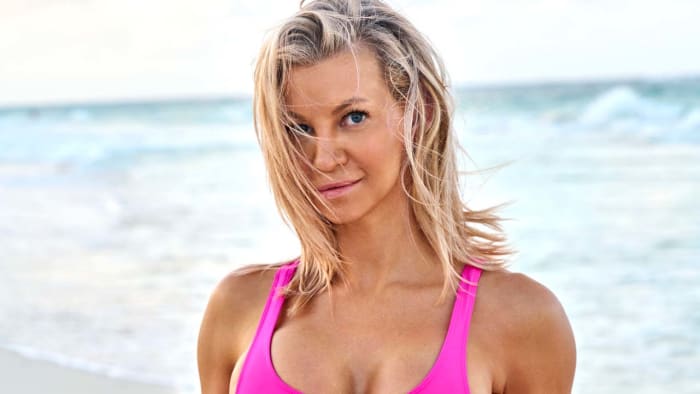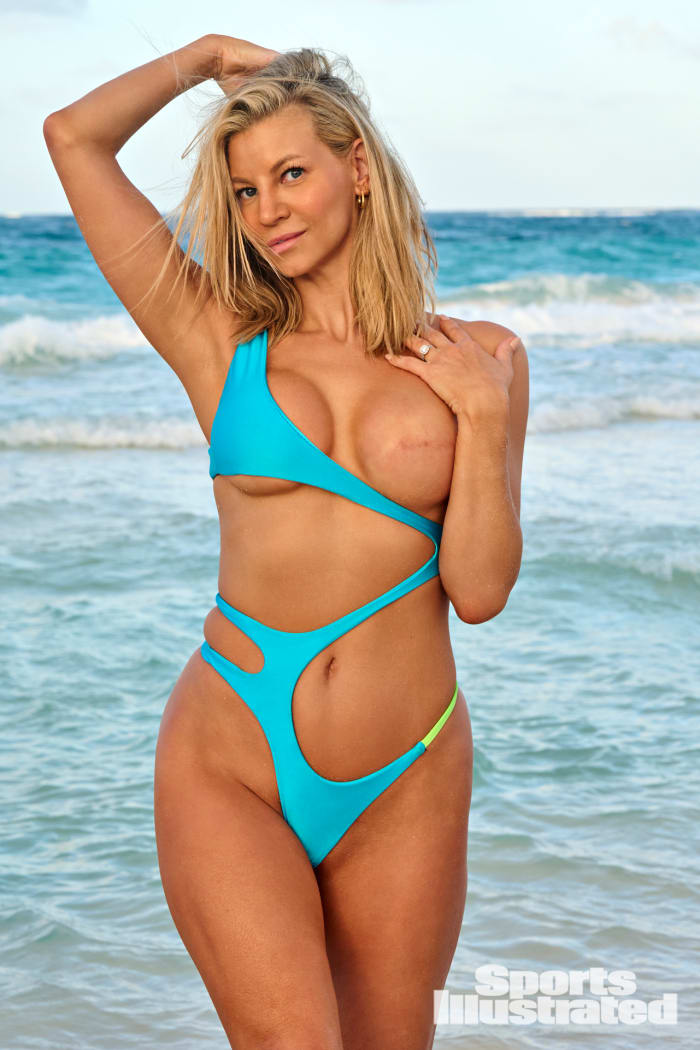Kelly Crump’s Incurable Breast Cancer Diagnosis Gave Her Life

Kelly Crump was photographed by Yu Tsai in Dominican Republic. Swimsuit by HAUS OF PINKLEMONAID.
October is Breast Cancer Awareness Month. According to the National Breast Cancer Foundation, one in eight women will develop breast cancer in their lifetimes. Aside from skin cancer, breast cancer is the most common skin cancer among women. Go here to find more information and ways to support.
Kelly Crump is living her best life – with Stage 4 incurable breast cancer. Before you wonder how that could possibly be, you will quickly learn about the 2022 SI Swim Search finalist’s determination, resilience and joie de vivre. “You can be miserable and feel like a victim, but I realized I have a choice, every single day, every time I wake up,” she says. “Is it going to be a good day or a bad day? No matter what happens to me, it’s about how I react to it. I choose to try to make the best of everything I can.”
Five years ago, at 38, Crump’s life was forever changed when she felt a lump in her breast. She took immediate action and made a doctor’s appointment, which confirmed her initial thought that she had breast cancer. “As soon as I saw how dimpled the underneath of my breast was, I was like, ‘This is cancer,’” Crump shares. “I don’t have a family history of cancer; I don't have BRCA1, and I didn’t really understand it, but it was almost a bit of a known. Within five days, I had the tumor removed with a lumpectomy, and then five days later, they told me I would need chemo.”
With a background in operations, logistics and management, Crump’s pragmatic instincts jumped in to face what lay ahead. She started to cut her hair because she knew it would fall out anyway and tried to mentally prepare. “Looking back, I was in such shock that, just like with any other trauma or hardship in someone's life, you’re getting through and there’s no kind of emotion there,” she recalls. “It’s fight or flight, and I [choose] fight. I’m the person that goes after the lion.”

Kelly Crump was photographed by Yu Tsai in Dominican Republic. Swimsuit by Asherah Swim.
Nothing is going to keep her down, not even being on her seventh drug treatment to fight against the continually mutating cancer or needing chemo every 21 days. “I was expecting to go back to work the next week or the next day, but basically what happened is I never went back,” says Crump, who was told her cancer was incurable in 2019. “It’s been very different from how I thought it would be, how I wanted it to be, but then you come to terms with it. [Not working] is probably one of the hardest aspects mentally of being in the situation that I’m in.”
As much as her Type A personality wants her to go nonstop, the reality is she has to listen to her body and take the time necessary to recover after each treatment. “The current drug I’m on, some days I’m O.K. and some days I’m not,” says Crump, who lives in London. “The biggest thing is the change in my energy. I can do one big thing a day, and I’m done. I won’t wake up for two days, no kidding, because I’ve done that. I’ve tried to get everything done, and then literally, it’s too much. I’ve really learned to pace myself, and I know what I can do and what I can’t do.”
And on her list of dos is walking 100 kilometers (a little over 62 miles). Last year she trekked that distance in the Scottish Highlands. On Nov. 11, she’ll be tackling the Sahara Desert with the organization CoppaFeel!, which is the first site she came across when she first found her lump. “I was one of very few Stage 4 incurable cancer people doing [the walk] last year,” she explains. “It was not about the physical challenge, but it was about supporting other people and helping them get through or feel better or finish the challenge. It was the most amazing experience. I initially signed up because I wanted to show people that [cancer] doesn’t always mean it’s over.”
Crump is also making it her mission to inspire and empower others as a cancer influencer with her lighthearted but impactful posts on social media. Below, she continues to share her experience, especially about how hearing the word incurable gave her life and what she does to stay positive.
How do you maintain such a positive outlook through all of this?
“You can’t control things that happen in your life, but you can control how you react to them, so you wake up every day and you go, ‘O.K., I’m just going to have a good day. I’m going to really try to not focus on all the crap that’s coming through, but let’s focus on the good things that are happening, the small things, the little things. And then let’s take care of ourselves. Let’s try to eat well, let’s move our body.’ Whatever that means for that day, given the energy I have or how I’m feeling. Let’s sleep, let’s rest, let’s meditate, write some gratitude, talk to a friend, listen to some good music and get by. And also, you just got to cry. I think that’s a big thing. I cry constantly. It’s so important to show just because you’re positive doesn’t mean it doesn’t hurt. It’s O.K. to have pain. It’s O.K. to go, ‘This absolutely sucks, and this is a bad situation,’ but it’s then how do you go, ‘O.K., all right, let’s get back to it,’ because it’s a choice. You’ve got to work at it like a workout. It’s a muscle; resilience is my new thing.”
I saw on your Instagram you speak about this exact thing…
“You have to believe it, but you have to practice it, and then you also have to have discipline in the sense of when that mind goes in that direction that it can go, you got to go, ‘Oh, stop.' Either let that emotion happen, process it, get through it and move on or just try to shift your mind. I’ll be standing in Mykonos watching the sunset; it’s amazing, and I’m literally bawling my eyes out because I’m wondering if this is going to be the last time that I’m ever in this place seeing this moment. That’s the mental game and struggle of cancer when it’s at this stage, but then you have to be like, ‘Stop. Look at this. You’re experiencing this.’ Stop being in the future or stop being in the past and be here.”
Who do you lean on when you are having those thoughts?
“I try to deal with it myself because I think it’s really important that, yes, you have a support system and you do have people to go to, but at the end of the day, you’re responsible for yourself as much as you can. It doesn’t mean that everybody can do that because again, it’s practice and learning and all these things, but as much as you can for yourself, do that. If that’s not working, then hopefully you have your support system and tribe. I’ve got my friends that I’ve been friends with for 20 some years from university I can call. I’ve got friends I’ve made here very close in London, I have my cancer friends, and honestly, I’ll even talk about it online. Social media has been such a big gift in a shocking way. I would’ve never thought this five years ago that I’m on social media telling people I’m having a really bad day, and people send the most amazing, supportive messages. Of course, I can go to my husband, but I think it’s really hard for him. I think people underestimate how hard it is for direct family members or partners. It’s just as hard on him as it is on me.”
How have you not let cancer define you?
“I don’t feel it defines me because I’m still completely myself. It just happens to be one of my passions. I think the reason I end up telling people is because it’s [now become a response to what do you do?] And this is where it always gets complicated, so I always have to read the room. I’m just like, ‘Oh, so I’ve got an illness, but I’m an influencer for breast cancer.’ I just drop it and say it normally. One day I’m going to do a reel about all the reactions… I’ve got one that goes, ‘Don’t say that.’ And I’m like, ‘Why not? It’s true.’ I had another person go, ‘How is it possible that you have breast cancer and you look like that, and I look like this?’ ‘Oh, I’m so sorry. My grandmother just died of breast cancer.’ I get that one all the time. Sometimes they don’t say anything. These are all common reactions, and it’s important to talk about it so that people kind of know a little bit more about how to deal with it when they’re talking about one in two of us are going to have cancer in our lifetime.”
That is a crazy statistic.
“Worldwide, 2.3 million were diagnosed with breast cancer in 2020. There were 685,000 deaths. In 2040, they’re expecting three million to be diagnosed with breast cancer and a million deaths. That’s worldwide; that’s with treatments. Breast cancer has overtaken lung cancer as the most commonly diagnosed cancer worldwide. We need to be talking, normalizing and feeling comfortable if someone has cancer so that we can support them mentally, physically, what have you, but also so we know how to deal with it. Hopefully something changes, but if we go along with that current statistic of one in two of us in our lifetime is going to have cancer, this is an epidemic. And we have a platform now to talk openly about so many different issues going on in the world, and this is just another one of them. Because it’s related to death, it is scary, hard and people don’t want to talk about it.”
It’s never easy…
“But how do we make it a little bit easier? I’m using cancer because that’s what I have and everything, but this is also about trauma and life in general because I’ve dealt with physical, sexual abuse growing up and many things that have happened in my lifetime that’s prepared me to be able to deal with the burden of this. At some point if it gets big enough, this is how you have to learn to deal with stuff that gets thrown at you in life.”
You talk a lot about feeling sexy and feminine, did you always feel that, or did you have to really work to regain that?
“I had a recurrence, which we found out randomly, and had an emergency bilateral mastectomy with reconstruction. I had been off chemo for a week and a half. I had about this much hair, and so it was really hard growing my hair out, not feeling good, being a different person. I went from this person who just had normal insecurities. I lost my hair, and on steroids gained almost 40 pounds in a very short amount of time. I couldn’t look at myself in the mirror for six months. I had no eyebrows, no eyelashes. I had no hair. I was a different body shape and composition than I’d ever been in my life. I didn’t recognize the person who I had been seeing for 38 years. That was way harder than I really anticipated. None of my clothes fit, so I had to buy new comfortable clothes. I felt horrible. I lost who I was.”
How did you get to loving yourself again?
“I think I was holding on to wanting to be who I was before I had cancer. I wanted to be that Kelly. I wanted that Kelly back because I didn’t like the Kelly that I had become. I think it was when it became incurable about three years ago. I was already kind of getting there slightly, but that’s when I think it was the tipping point in terms of my mindset of how I really, truly thought about every single thing. What I worried about, what I didn’t worry about, how I viewed life. Then COVID-19 happened three months later, and I was so scared that I was going to die in my home of COVID-19, not traveling the world, not doing things I wanted to do. It was those things that tipped me over and put me where I am today and made me go, ‘You know what? It happened to you. It doesn’t mean that you have to be that way, and you are Kelly. You’re just a different version. You’re still her. You’ve still got this thing, but now you need to kind of shift a bit. You need to adapt.’”
Looking back to the Kelly before and the Kelly now, do you like this version better?
“I think the biggest thing, most importantly, is cancer and incurable cancer made me say to myself, ‘I have nothing to lose about being myself now.’ I don’t care what you think. I don’t care if you think I’m loud, if you think I cuss too much. I don’t care if you don’t like the way I dress. It doesn’t matter. I started living. I had nothing to lose and that is what gave me joy because so much up until that point was, ‘Am I pretty enough? Am I successful enough?’ You’ve got all these people and things telling you what is right, what’s wrong with you, and then you’ve got your own voice, and it was just so complicated. I still have moments, but it’s not the same. I’m much more confident, and I just don’t care because at the end of the day, I don’t want to be in my last moment, wherever I am, going, ‘I wish I had been more myself. I wish I had done this. I wish I had done that.’”
You now call yourself a cancer influencer…
“This is a whole new thing for me. At the end of the day, if it just makes one person feel better about their body or their situation, then I’m happy. If it makes someone check their breasts consistently in a non-scary or fearful way, and if I can teach people how to be happier with what life throws at them, then I’m doing my work. I just want people to laugh and have a giggle, and I want to empower them.”
.
